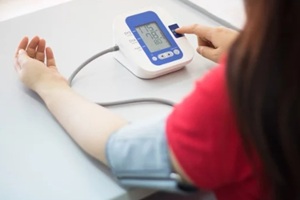 Hypertension, commonly known as high blood pressure, has been dubbed the “silent killer” because it often has no obvious symptoms. Yet, uncontrolled high blood pressure can lead to serious health issues, including heart attack, stroke, and kidney disease.
Hypertension, commonly known as high blood pressure, has been dubbed the “silent killer” because it often has no obvious symptoms. Yet, uncontrolled high blood pressure can lead to serious health issues, including heart attack, stroke, and kidney disease.
However, when detected early, hypertension can be effectively managed through lifestyle changes and medication. This is why regularly checking your blood pressure is so important, as it provides essential feedback, allowing you to track your numbers and determine whether lifestyle and treatment approaches are working.
Read on to learn why you should make home blood pressure monitoring a regular habit.
Gain Valuable Insight Through Home Monitoring
One of the biggest advantages of keeping tabs on your blood pressure at home is gaining greater insight into your particular hypertension patterns. Blood pressure fluctuates naturally throughout the day. It tends to be lowest during sleep and rises sharply upon waking.
Numbers peak in the late afternoon and evening. Blood pressure checks during doctor visits may not reveal your typical range if taken during periods of natural fluctuation. Home monitoring allows you to take readings at consistent times under familiar conditions for a more accurate picture.
You can also track changes over days, weeks, and months to determine whether lifestyle remedies and medications are effective. Discuss the ideal timing and frequency of home checks with your doctor to inform treatment decisions.
Detect Hypertension Early
Many people have no symptoms in earlier stages of high blood pressure, allowing it to go undiagnosed for too long. In fact, around 13 million Americans are unaware they have hypertension. Home monitoring allows early detection, which is essential for preventing complications.
If your at-home numbers reveal blood pressure creeping above normal ranges, you can take action via lifestyle adjustments before levels become dangerously high. Early intervention also means avoiding or minimizing medication through natural approaches such as weight loss, exercise, and dietary improvements.
Lower Health Care Costs

Uncontrolled hypertension often requires frequent doctor visits, an array of medications, and even hospitalization when catastrophic events such as a stroke occur. Maintaining normal blood pressure through home monitoring reduces associated healthcare expenses.
Fewer medications, tests, and appointments cut costs over the long run. What’s more, preventing grave outcomes such as heart attacks and strokes translates to significant care savings. Monitoring at home allows you to be proactive, identifying and addressing rising blood pressure before expensive interventions become necessary.
Enable Shared Decision Making
Tracking your blood pressure patterns over an extended time grants you greater knowledge about your hypertension and how specific actions impact your numbers. You become better equipped to make smart, informed decisions with your healthcare providers regarding lifestyle habits and medication options.
Discussing your detailed home records with doctors allows collaborative customization of treatment to your specific health profile and needs. Shared decision-making aligns treatment approaches with your preferences and values for improved compliance and outcomes.
Reinforce Healthy Lifestyle Habits
For many with high blood pressure, medications provide needed assistance, but natural remedies remain foundational. Home monitoring gives instant feedback regarding how daily habits influence your numbers, reinforcing healthy behaviors.
 For instance, if you observe blood pressure lowering on days when you adopt stress-relieving practices or eat more potassium-rich foods, you will be positively incentivized to persist. Your numbers serve as visible “proof” that natural approaches make a difference, powerfully motivating the maintenance of healthy regimens.
For instance, if you observe blood pressure lowering on days when you adopt stress-relieving practices or eat more potassium-rich foods, you will be positively incentivized to persist. Your numbers serve as visible “proof” that natural approaches make a difference, powerfully motivating the maintenance of healthy regimens.
Foster a Sense of Control and Empowerment
When first diagnosed with hypertension, many feel overwhelmed or helpless against this formidable foe. Consistently high numbers can breed anxiety and hopelessness regarding your capacity to lower them without medication escalation. Home monitoring helps counter such feelings of powerlessness.
Watching your blood pressure rise and fall in response to remedies grants an encouraging sense of control and self-efficacy. Witnessing positive impacts motivates continued diligence. Tracking also allows adjustment if numbers plateau, empowering active management.
Enhance Medication Adherence
The lack of obvious symptoms makes medication adherence challenging for some hypertension patients. However, home checking provides clear evidence that skipping pills leads to number spikes. When you monitor consistently, missed doses become obvious through rising blood pressure.
Such observable cause-and-effect inspires improved adherence. Detailed records also help fine-tune medication timing to maximize effectiveness. For instance, if pressure seems lowest at night but creeps up by morning, adjusting dose timing may help smooth out dips and peaks.
Discern the Accuracy of Medical Readings
 Anxious reactions during medical visits can artificially elevate blood pressure, an occurrence dubbed “white coat syndrome.” Home monitoring allows comparison to medical readings to discern such situational spikes.
Anxious reactions during medical visits can artificially elevate blood pressure, an occurrence dubbed “white coat syndrome.” Home monitoring allows comparison to medical readings to discern such situational spikes.
If your checked pressure is consistently lower at home, white coat syndrome may be skewing doctor visit numbers. Notifying your physician allows notation on your chart, preventing unnecessary medication increases attempted to lower office readings reflecting temporary anxiety rather than typical levels.
Consult the Hypertension Specialists at Imperial Center Family Medicine
If you have been diagnosed with high blood pressure, Imperial Center Family Medicine’s team of professionals has helped countless patients manage this common condition. Regularly monitoring your blood pressure at home, along with our skilled guidance, provides a powerful combination for restoring numbers to healthy ranges.
Contact us today at 919-873-4437 or book a consultation online to learn about how we can help you gain control over your blood pressure.
